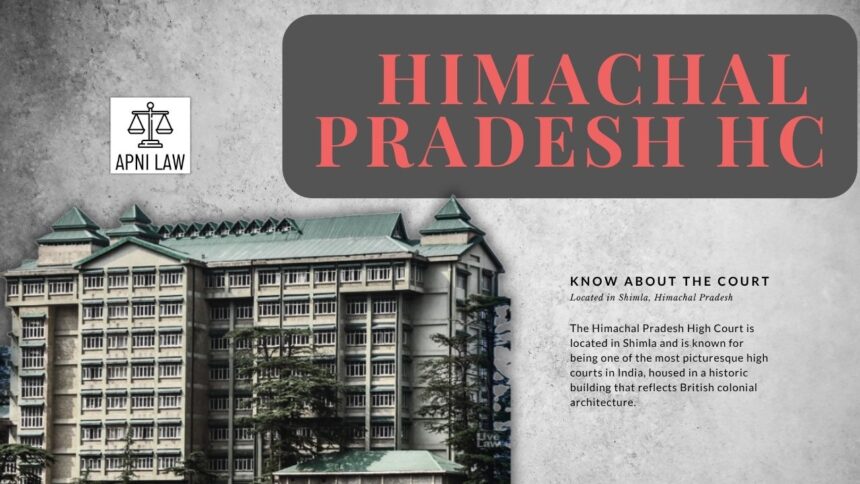Introduction
In the case of Kamli & Ors v. Boby Chauhan & Ors, the Himachal Pradesh High Court ruled that the registered owner of a motor vehicle remains liable for accidents under the Motor Vehicles Act, 1988 until all legal formalities of ownership transfer are completed. The Court emphasized that ownership liability continues to rest with the person whose name remains on the registration certificate, regardless of any private sale agreement.
Facts of the Case
The case arose from a 2016 accident involving a vehicle registered in the name of Mr. Boby Chauhan. The driver of the vehicle lost control, resulting in the tragic deaths of three occupants. The dependants of the deceased filed claim petitions before the Motor Accident Claims Tribunal seeking compensation. However, the tribunal dismissed the petitions, holding that the claimants had failed to prove rash or negligent driving.
The dependants appealed the tribunal’s decision before the Himachal Pradesh High Court. During the proceedings, the respondent argued that he had already sold the vehicle to the driver, Mr. Gian Chand, before the accident took place and therefore should not be held liable. The Court examined the evidence and found that although a sale agreement existed, the legal transfer of the vehicle under Section 50 of the Motor Vehicles Act had not been completed at the time of the accident. The transferee had not reported the transfer within the statutory period, and the transferor had not notified the registration authority within fourteen days as required by law. Consequently, the Court held that the sale was incomplete in the eyes of the law.
What the Court Says
The Himachal Pradesh High Court relied on Section 50 of the Motor Vehicles Act, 1988, which clearly prescribes the procedure for transferring ownership of a registered vehicle. The provision mandates that when ownership of a vehicle is transferred, the transferor must report the transfer to the Registration Authority within 14 days, and the transferee must report it within 30 days. Until these formalities are completed, the registered owner remains legally responsible for any accidents involving the vehicle.
In this case, the Court noted that before the 30-day period expired, the vehicle met with the accident. This meant the ownership transfer had not yet been finalized, and the vehicle continued to be legally registered in the respondent’s name. Therefore, the Court concluded that the registered owner was liable for the accident. It set aside the tribunal’s earlier decision and allowed the appeals filed by the dependants, holding the registered owner responsible for paying compensation to the victims’ families.
Implications
This judgment provides important clarity regarding liability in motor vehicle accidents. It confirms that the registered owner of a vehicle remains accountable until the transfer of ownership is legally completed in the records of the registering authority. The ruling protects accident victims by ensuring that there is always a definite, identifiable party who can be held responsible for compensation.
For vehicle owners, the decision serves as a reminder of the importance of completing all transfer formalities under Section 50 of the Motor Vehicles Act. Simply executing a sale agreement is not sufficient to escape liability. Owners must notify the registering authority of the sale within the stipulated period and ensure that the buyer also files the necessary report. Failure to do so leaves the seller exposed to legal liability for any accidents involving the vehicle after the sale.
For buyers, the judgment highlights the necessity of promptly updating registration records. Until the transfer is reflected in the registration certificate, the buyer is not legally recognized as the owner. From a legal and insurance standpoint, the registered owner remains responsible for third-party liabilities.
The ruling also strengthens legal certainty in accident claims by linking ownership liability to statutory compliance rather than private agreements. It ensures that victims and insurers can easily determine who is legally accountable at the time of an accident. Moreover, it aligns with the broader objective of the Motor Vehicles Act, to facilitate prompt and fair compensation to victims of road accidents without prolonged disputes over ownership.
For any specific query call at +91 – 8569843472
Conclusion
The Himachal Pradesh High Court’s decision in Kamli & Ors v. Boby Chauhan & Ors underscores a vital legal principle, the name on the registration certificate determines liability. Until the ownership transfer is duly recorded by the registering authority, the original registered owner remains legally liable for any accidents involving the vehicle. The judgment serves as a strong reminder to both vehicle sellers and buyers to complete ownership transfers promptly to avoid future legal complications and liability under the Motor Vehicles Act, 1988.








